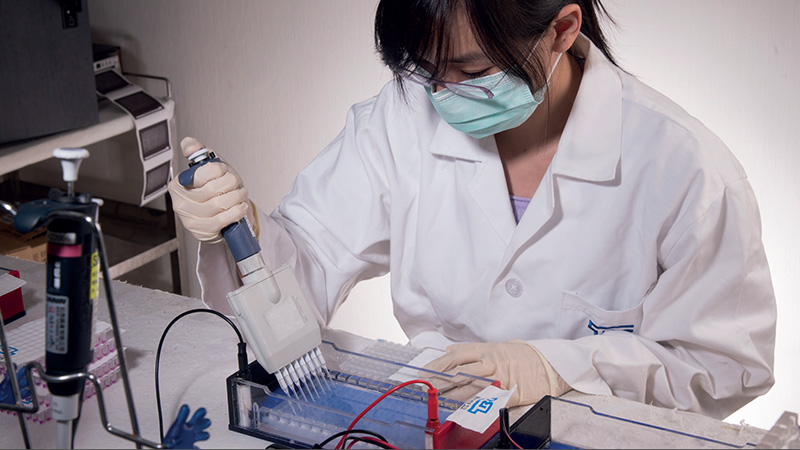TBG Diagnostics - Case Study

Jitto Arulampalam, Executive Chairman
From the Asialink Business Taiwan Starter Pack
Most Australians trying to crack the Chinese market take the direct route, getting an initial foothold in mainland commercial centres such as Shenzhen or Shanghai. But for Melbourne investment banker Jitto Arulampalam, there was a more logical and surer pathway into the world’s biggest marketplace, and it began in Taiwan.
Mr Arulampalam is executive chairman of TBG Diagnostics, a fast-growing biotechnology firm that has the ambitious goal of becoming one of the leading medical diagnostic suppliers in Asia. In recent years Mr Arulampalam oversaw the purchase and restructure of Taiwan-based TBG, and he is now leading its pursuit of success across Asia and beyond.
TBG is a global supplier of molecular diagnostics kits. Designed to address the diverse needs of HLA labs, TBG’s molecular product includes, sequence-based typing (SBT) and sequence-specific primers (SSP). In addition, TBG has various products under development in categories such as oncology, infectious disease, blood screening and genetic testing. The products are being geared principally towards the Chinese market, but also other parts of Asia and the world.
Mr Arulampalam says Taiwan has critical advantages over rival locations as a launch pad into China and the rest of Asia – at least for certain types of companies and industries.
First, for companies working in the biotechnology space, China now officially recognises Taiwan’s system of regulatory approval. China and Taiwan’s relationship has always been very a complex one. However, over the years, many measures have been taken to improve cross-strait relations. In one recent example that delivers potentially significant benefits for biotechnology companies, an agreement between Taiwan and China has led to four hospitals in each jurisdiction having mutual recognition for their clinical trial data. This major breakthrough will cut cost for drug companies and shorten the timeline for getting new drugs to both markets.
Due to the unique relationship between China and Taiwan, China has also created incentives for Taiwan-based companies to operate in China. TBG has been a beneficiary of this, having been granted various incentives and concessions when setting up its manufacturing site in Xiamen, China.
‘‘If you are an Australian biotech company, it’s very hard to launch your product in China. It would take years for us to launch our products’ Mr Arulampalam says. ‘‘Because of the reciprocal rights that China and Taiwan have, we found that acquiring a business in Taiwan presented a great opportunity for accessing China and the wider Asian market.
‘‘Things have opened up a lot in the last five years,’’ Mr Arulampalam says. ‘‘It’s about bringing technology and innovation into China. They are very happy to receive Taiwanese products and services for the local market.
It is a given that the Taiwanese, because of their shared language, culture and history with China, have natural advantages when doing business there. In addition, now that Beijing has more of an open door, Mr Arulampalam says employees of many Taiwanese companies, including his own, already have relationships and business experience in China. ‘‘So it was so much easier for us to acquire the business in Taiwan and go forward.’’
Another major factor in the choice of Taiwan as a base was its superiority in advanced manufacturing. Mr Arulampalam says Taiwan is ‘‘streets ahead of the rest’’ when it comes to the highly innovative end of the manufacturing spectrum – in areas ranging from high-precision instruments to nanotechnology, biotechnology and semiconductors.
‘‘With the skillset of the workforce, the innovation, the work ethic, all of that made it very appealing to us as a diagnostic company going forward,’’ he says. ‘’We felt it would be a great manufacturing hub for us.’’ The other critical advantage of establishing in Taiwan was access to finance through capital markets that have a strong appetite for investment in innovation. Of $12.5 million that TBG obtained in its last capital raising, the vast majority came from Taiwan – even though TBG is listed on the Australian Stock Exchange.
‘‘Our company, while earning revenue, is not yet making a profit, and won’t be making a profit next year either,’’ Mr Arulampalam says. ‘‘Therefore we would have struggled to raise the capital in Australia.
‘‘Taiwan capital markets really get this. They are quite happy to make long-term investments in companies that are at the early stage of their commercialisation cycle.’’
Mr Arulampalam’s enthusiasm for Taiwan as a gateway to China comes with one important qualification: its relatively high wages and cost levels make it unsuitable as a base for some types of exports and manufacturing.
‘‘It comes down to what type of business you are in,’’ he says. ‘‘For example, if you’re a dairy company in Australia, you would go direct to China. But anything in the innovation space – high tech, IT, nanotechnology, biotech – that’s where Taiwan as a gateway makes absolute sense.’’
Looking to expand your knowledge further? Explore other market-leading research & resources by Asialink Business.
